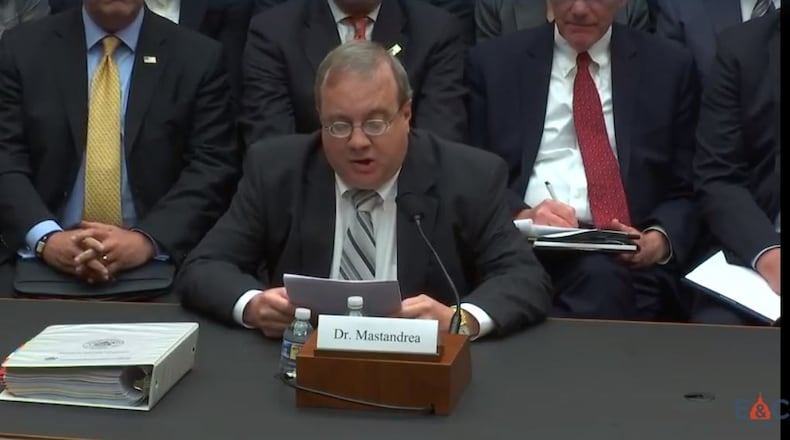Miami-Luken and four of the other distributors are also being sued by the Ohio Attorney General’s Office, which accuses the companies of unsafe practices that led to opioids being abused.
Miami-Luken’s chairman Dr. Joseph Mastandrea early in the hearing in D.C. was asked whether he thought distributors actions contributed to the opioid crisis. Mastandrea said yes.
RELATED: Why Springboro drug distributor is under fed scrutiny
“The Ohio Attorney General’s Office watched the hearing with great interest and intends to follow up on the issues and questions raised during the hearing and subsequent responses,” stated Dan Tierney, spokesman for Ohio Attorney General Mike DeWine.
DeWine, who is also running for Ohio governor, has promoted fighting the opioid crisis as part of his platform, and his office filed the lawsuit against the pharmaceutical distributors during his run of the Republican nomination.
U.S. Rep. David McKinley, of West Virginia, who is not a member of the committee but was granted permission to ask questions to the executives, said the executives were deflecting responsibility when they said they were just filling orders.
“So what’s the proper accountability? What’s the punishment?” he said. “It’s just a slap on the wrist? Maybe a hundredth of one percent of the revenue? What’s the accountability? What’s the punishment that fits this crime?”
Several times during the hearing, Mastandrea admitted to shortcomings in response to questions by the committee members.
Mastandrea answered “Yes” when asked if the company had failed to prevent the opioids being diverted for misuse. He also answered “Yes” when asked if the large volume of pill shipments to small West Virginia towns indicates a breakdown in the system the distributors were supposed to have to monitor for suspicious orders.
RELATED: Congress continues investigation into Springboro pharmacy distributor
He also pointed a finger at past management during the hearing. Miami-Luken’s former chief executive Anthony Rattini was removed as U.S. Drug Enforcement Administration inquiries increased.
Mastandrea said it was his understanding that the former management of his company took what they thought at the time were sufficient steps “believing that State Medical Boards and Pharmacy Boards were in a stronger position to monitor the physicians and pharmacists they licensed.” He said Miami-Luken now knows that was not enough.
“And as you know from the materials we provided this committee last year, Miami-Luken has taken aggressive actions going back several years to strengthen its compliance efforts and suspicious order monitoring system,” he said. “And as I sit here now, I can assure you that our company employs a compliance program that is second to none.”
Mastandrea said Miami-Luken has since stopped doing business with some customers, and since 2014, has reduced the sale of Oxycodone by 61 percent, and the sale of Hydrocodone by 50 percent.
RELATED: Local people share their addiction recovery stories
During Tuesday’s hearing, U.S. Rep Bill Johnson, of Ohio, brought up a case involving a Scioto County “pill mill” doctor who pleaded guilty last year to conspiracy to distribute a controlled substance. Miami-Luken directly supplied the doctor with large orders of prescriptions, including prescription opioids.
Johnson read to Mastandrea information from DEA report that said a Miami-Luken salesman conducted an inspection of the clinic in 2008 that was “cursory at best” and didn’t take into account the area’s prescription drug problem. Then in 2009, then CEO Rattini and a compliance manager showed up to investigate when the clinic was closed and never returned.
Johnson asked if that felt like due diligence.
“Due diligence was attempted in that particular situation,” Mastandrea said.
“When they showed up and didn’t show back up? The alarm bells didn’t go off?’” Johnson said.
“I said it was attempted,” Mastandrea said.
THE STORY SO FAR
PREVIOUSLY: After a year of investigating, a congressional committee called Springboro-based Miami-Luken and four other distributors to D.C. to answer questions under oath.
WHAT'S NEW: The Ohio Attorney General's Office is suing four of the distributors said it "intends to follow up on the issues and questions raised during the hearing and subsequent responses."
WHAT'S NEXT: The congressional committee is continuing the investigate the opioid epidemic and the distributors. Committee members have 10 business days after the hearing to submit additional questions and the executives who testified will answer the questions.
About the Author
